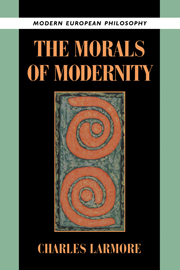Book contents
- Frontmatter
- Contents
- Acknowledgments
- Introduction
- I Modern Ethics
- II Beyond Naturalism
- III Liberalism and Modernity
- 6 Political Liberalism
- 7 Pluralism and Reasonable Disagreement
- 8 Carl Schmitt's Critique of Liberal Democracy
- 9 Modernity and the Disunity of Reason
- 10 The Foundations of Modern Democracy: Reflections on Jürgen Habermas
- Index
8 - Carl Schmitt's Critique of Liberal Democracy
Published online by Cambridge University Press: 18 December 2009
- Frontmatter
- Contents
- Acknowledgments
- Introduction
- I Modern Ethics
- II Beyond Naturalism
- III Liberalism and Modernity
- 6 Political Liberalism
- 7 Pluralism and Reasonable Disagreement
- 8 Carl Schmitt's Critique of Liberal Democracy
- 9 Modernity and the Disunity of Reason
- 10 The Foundations of Modern Democracy: Reflections on Jürgen Habermas
- Index
Summary
Carl Schmitt was one of the most famous German political theorists of this century, but it is not possible to separate his renown from the controversy that swirls around his life and work. He is notorious for his dubious loyalty to the Weimar Republic and for his active involvement with the Hitler regime. He owes his intellectual fame to a series of writings spanning more than four decades and united in their merciless repudiation of modern liberal democracy.
In this essay I pursue the limited aim of examining the cogency of this critique of liberal democracy, particularly as it is laid out in his short book of 1923, Die geistesgeschichtliche Lage des heutigen Parlamentarismus. I will refer only in passing to his other works, many of which might seem to be more substantial scholarly treatises, since I do not believe they add anything essential to the principal features of this critique. Also, I will focus on the quality of the arguments in the 1923 book, largely leaving aside its historical context, the rhetorical strategies Schmitt deploys, and the political agenda that lies concealed in a discourse that presents itself as detached and philosophical. But I do not mean to suggest that these are unimportant factors in understanding the nature of Schmitt's thought – far from it. My purpose in concentrating on the soundness of his arguments is to confront directly the reason most often given for why we should pay special attention to his critique of liberal democracy.
- Type
- Chapter
- Information
- The Morals of Modernity , pp. 175 - 188Publisher: Cambridge University PressPrint publication year: 1996



